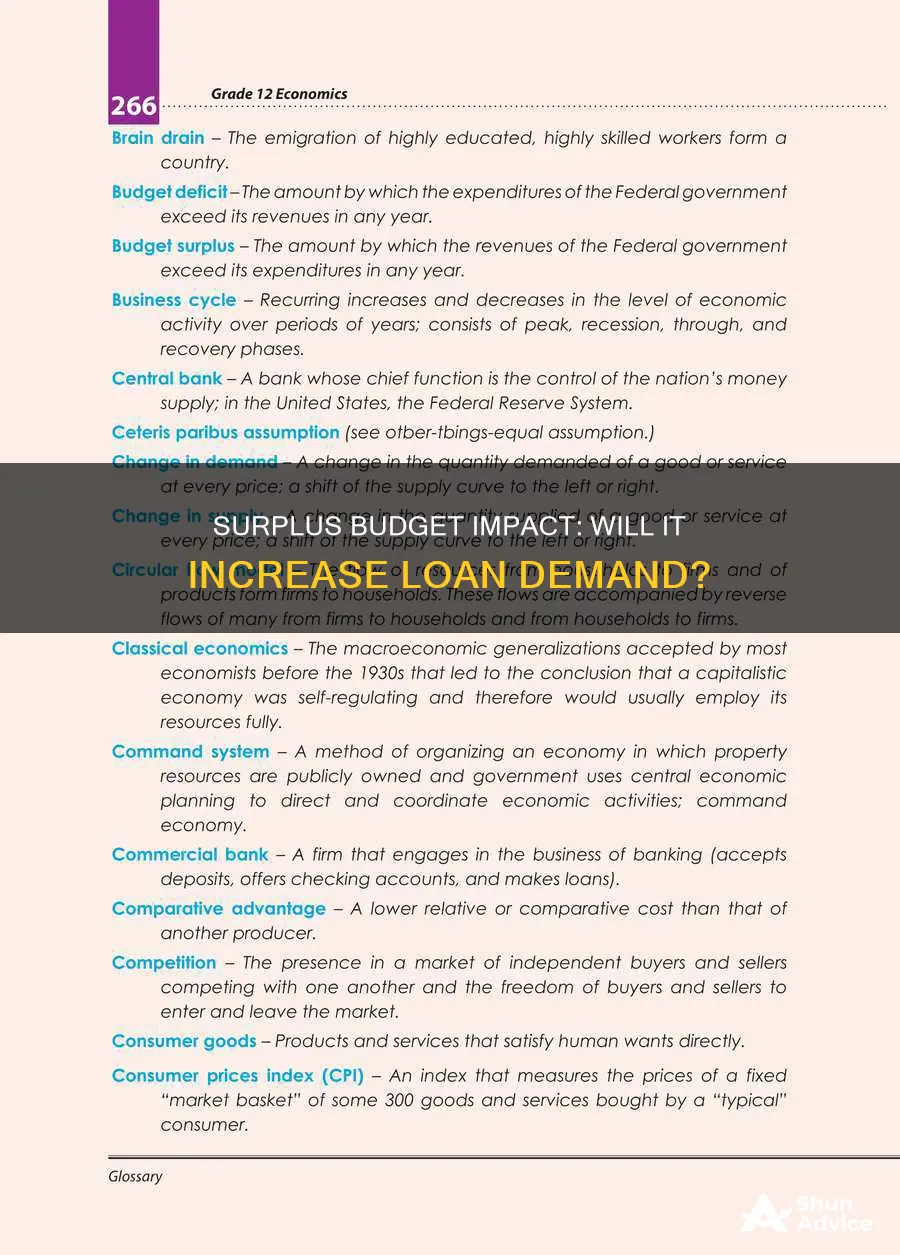
A budget surplus occurs when a government earns more than it spends, usually during a booming economy. This can be achieved by increasing taxes, decreasing spending, or both. While a budget surplus can help curb excess growth and inflation, it can also negatively impact economic growth and long-term productive capacity. A surplus also contributes to a reduction in debt, which is positive for interest rates. Lower interest rates can increase borrowing to finance consumption and investments. However, it's important to note that the impact of a budget surplus on loan demand is complex and depends on various economic factors and market conditions.
| Characteristics | Values |
|---|---|
| Definition of a budget surplus | When the government plans to spend less than it earns |
| How to achieve a budget surplus | Cut spending and/or increase taxes |
| Impact on growth | May have an adverse effect on the rate of economic growth |
| Impact on national savings | Increase in national savings to finance capital investment |
| Impact on government borrowing | No need to borrow funds to finance projects |
| Impact on interest rates | Lower interest rates |
| Impact on private investments | More money for private investments |
| Impact on public sector investment | Cutback on public sector investment |
| Impact on unemployment | May lead to higher unemployment |
What You'll Learn

Budget surplus and its impact on national savings
A budget surplus occurs when a government's income exceeds its expenditures, or when government tax receipts are greater than government spending. This can be achieved by increasing taxes, reducing public services, or a combination of both. While budget surpluses are generally considered a good thing, they can also have negative implications for the economy.
The impact of a budget surplus on national savings is complex and depends on various factors, including economic growth, demographic considerations, and government policies. Firstly, a budget surplus can contribute to an increase in national savings by reducing government debt. Lower debt levels lead to reduced interest rates, making it cheaper for both individuals and the government to borrow money. This increase in savings can be used to finance domestic investment and lending to foreigners, further stimulating the economy.
However, the relationship between budget surpluses and national savings is nuanced. While a surplus can lead to higher national savings, it may also result in reduced government investment in public goods and services, such as infrastructure, education, and social security. This reduction in government investment can have a detrimental effect on the economy's long-term productive capacity. Additionally, budget surpluses achieved through high taxes or reduced public services can result in a net loss for the economy as a whole, as the wider economy misses out on the multiplier effect of government spending.
The impact of a budget surplus on national savings also depends on the underlying reasons for the surplus. If the surplus is a result of decreased government spending, it may have a negative impact on national savings. This is because a decline in government investment can lead to a fall in national saving over time. On the other hand, if the surplus is due to an increase in revenue, it may have a more positive effect on national savings.
In summary, while a budget surplus can contribute to increased national savings and reduced debt, it is important to consider the methods used to achieve the surplus and the potential trade-offs involved. The impact of a budget surplus on national savings is multifaceted, and the implications can vary depending on economic conditions and government policies.
Does Lending Money Make You a Business?
You may want to see also

How does a budget surplus affect interest rates?
A budget surplus occurs when a government's revenue exceeds its spending. This usually happens when the economy is prospering and expanding, with increased economic activity and higher corporate profits. As a result, government tax revenues increase, while government spending decreases due to reduced demand for welfare benefits and unemployment compensation.
A budget surplus can have implications for interest rates in the economy. Firstly, a surplus contributes to a reduction in government debt. When the government runs a deficit, it borrows money, increasing the debt; when there is a surplus, the debt shrinks. This reduction in debt is generally positive for interest rates as it lowers the risk of default.
Additionally, a budget surplus can lead to an increase in national savings, which includes both public and private savings. This increase in savings represents the total loanable funds available in the domestic economy. With more funds available, the demand curve for loans shifts inward, pushing interest rates lower. Lower interest rates encourage more borrowing by consumers and businesses, stimulating investment and economic growth.
However, it is important to note that the impact of a budget surplus on interest rates can vary depending on the reason behind the surplus. For example, if the surplus is achieved through spending cuts rather than increased revenue, it could have adverse effects on economic growth. Additionally, in a fragile economic recovery, austerity measures implemented to achieve a surplus may lead to higher unemployment and hinder the economy's potential.
Furthermore, while a budget surplus can reduce government borrowing and debt, it may also result in reduced investment in public sector areas such as infrastructure, education, and skills development. This could potentially harm the long-term productive capacity of the economy. Therefore, the impact of a budget surplus on interest rates and the overall economy is complex and depends on various factors and policy choices.
BigCommerce Capital Loans: What You Need to Know
You may want to see also

Budget surplus and its impact on government borrowing
A budget surplus occurs when a government's income exceeds its expenditures during an accounting period, which is usually a fiscal year. This means that the government's revenue is greater than its spending. Budget surpluses tend to occur when the economy is prospering and expanding, with increased economic activity and higher corporate profits. Consequently, the government collects more taxes, while also spending less on welfare benefits and unemployment compensation.
The impact of a budget surplus on government borrowing is that it reduces the need for it. The government can use the excess funds to pay off existing debts or reinvest them in other projects. A budget surplus also contributes to an increase in national savings, which can be used to finance domestic investment and lending to foreigners. Additionally, a surplus can lead to lower interest rates, making it easier for people and businesses to borrow money at a lower cost.
However, a budget surplus can also have negative consequences. It may result in reduced government spending on public services, potentially impacting the wider economy and leading to lower economic growth. To achieve a budget surplus, the government may need to cut back on public sector investment, which could harm the long-term productive capacity of the economy.
The impact of a budget surplus on government borrowing is complex and depends on various economic factors. While a surplus can reduce the immediate need for borrowing, it may also impact the economy in ways that require borrowing in the future. The best course of action depends on the specific economic situation and priorities of the government.
Borrowing from Your 401k: Impact on Mortgage Loan Process
You may want to see also

Budget surplus and its impact on economic growth
A budget surplus occurs when a government's income or revenue exceeds its spending. In other words, the government plans to spend less than it earns. This results in a positive balance, allowing for potential savings, investment, or debt reduction.
To ensure a budget surplus, the government may have to cut spending and/or increase taxes, depending on economic growth and demographic factors. For instance, an ageing population requiring more pension spending can make achieving a budget surplus more challenging.
The implications of a budget surplus for the economy can vary depending on the reason behind the surplus, whether it is due to a decrease in spending or an increase in income. A budget surplus can contribute to an increase in national savings, which is useful for financing domestic investment and lending to foreigners. It can also help reduce debt, which is positive for interest rates in the economy.
However, a budget surplus can also have adverse effects on the rate of economic growth. If government spending is cut, it will negatively affect aggregate demand and could lead to lower growth. Additionally, a budget surplus may lead to reduced spending on public services and public sector investment, which could harm the long-term productive capacity of the economy.
Keynesian economics suggests that a budget surplus could help prevent excess growth and inflation in a booming economy. However, if the economy is not strong enough to absorb austerity and fiscal tightening, targeting a budget surplus may lead to higher unemployment and the economy operating below its full potential.
In summary, while a budget surplus can have benefits such as increased national savings and reduced debt, it is essential to consider the potential trade-offs in terms of economic growth, public investment, and overall economic health. The impact of a budget surplus on economic growth will depend on various factors, including the specific economic situation and priorities of a country.
Bridgecrest Loan Reinstatement: What You Need to Know
You may want to see also

Budget surplus and its impact on public sector investment
A budget surplus occurs when a government's revenue exceeds its spending. This can be a result of increased tax income, reduced spending, or a combination of both. While a budget surplus can be a positive indicator of an efficient economy and good fiscal management, it can also have implications for public sector investment.
When a government runs a budget surplus, it often signals a commitment to fiscal discipline and a focus on reducing debt. This can lead to reduced public sector investment in areas such as infrastructure, education, healthcare, and welfare plans. The government may prioritise achieving and maintaining a surplus over investing in these areas, resulting in limited resources for public projects. This can have long-term consequences for the economy, potentially impacting productivity and growth.
For example, a government might cut back on investment in railways, roads, housing, or education. These areas are typically not addressed by private firms, as they are considered public goods. As a result, a reduction in government investment could lead to a decline in the long-term productive capacity of the economy. This was evident in the UK, where the main issue was identified as poor productivity growth rather than the budget deficit.
However, a budget surplus can also have some positive effects on the economy. It can contribute to increased national savings, which can be used to finance capital investment and increase the economy's productive capacity. Additionally, a surplus can lead to reduced government borrowing, which allows the private sector to borrow at lower interest rates. This can enhance the profitability of private firms and encourage greater investment in various sectors.
In conclusion, while a budget surplus can indicate sound fiscal management, it may come at the cost of reduced public sector investment. The impact of a surplus depends on the specific economic context and the government's priorities. Achieving a balance between fiscal discipline and investing in areas that support long-term economic growth is crucial for the overall health of the economy.
Binghamton University's Perkins Loan Participation Explained
You may want to see also
Frequently asked questions
A budget surplus occurs when a government's revenue is greater than its spending.
A budget surplus can contribute to an increase in national savings, which can be used to finance domestic investment and lending to foreigners. It can also lead to a reduction in debt, which is positive for interest rates. However, achieving a budget surplus may require the government to cut spending in areas such as public sector investment, which could harm the long-term productive capacity of the economy.
A budget surplus can put downward pressure on interest rates. With a decrease in government spending, the demand curve for the loanable funds market shifts inward, pushing interest rates lower.
A budget surplus can be compatible with strong economic growth, particularly in a booming economy. However, if the government is forced to increase taxes or cut spending to achieve a surplus, it could negatively affect economic growth.
A budget surplus can increase the supply of loanable funds, leading to lower interest rates and increased demand for loans. This is because, with lower interest rates, the cost of borrowing decreases, making loans more attractive to potential borrowers.







